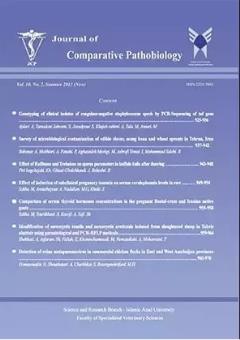Investigating the protective effects of nano-emulsion based on Nigella sativa in benign prostatic hyperplasia induced by testosterone administration
Subject Areas : Journal of Comparative Pathobiology
Mohammadali Jafari
1
,
Negar Panahi
2
*
,
saeed hesaraki
3
![]() ,
Gh Akbari
4
,
Gh Akbari
4
1 - Department of Veterinary Basic Sciences, Science and Research Branch, Islamic Azad University, Tehran, Iran
2 - Department of Veterinary Basic Sciences, Science and Research Branch, Islamic Azad University, Tehran, Iran
3 - Department of Pathology, Science and Research Branch, Islamic Azad University, Tehran, Iran
4 - کروه علوم بالینی ، دانشگاه آزاد اسلامی واحد علوم و تحقیقات تهران، تهران ، ایران
Keywords: prostate hyperplasia, drug delivery system, nano-emulsion, black seed, alternative medicine,
Abstract :
Quercetin (Qu) is a type of plant flavonoid that is useful in fighting hyperplastic prostate cells. Meanwhile, black seed oil (NSO) shows promise in relieving the symptoms of benign prostatic hyperplasia (BPH). The aim of this study is to evaluate the effects of quercetin combined with NSO-based nanoemulsion (Qu-NSO) on a BPH mouse model. This study included inducing BPH in rats using testosterone enanthate subcutaneously and administering various treatments including quercetin, NSO and Qu-NSO both (25 and 50 mg/kg) orally to evaluate the effects of Qu-NSO. The spherical size and zeta potential of the formed vesicles were measured. Prostate weight and index with its specific antigen (PSA), dihydrotestosterone (DHT) level, oxidant and antioxidant markers, and prostate histopathology were investigated in the desert rat model. The average globule size for Qu-NSO was obtained with the value of zeta potential in millivolts. Qu-NSO reduced prostate weight by 40% and prostate index by 86.71% compared to testosterone group. The thickness and height of the epithelial tissue and the number of micropapillae under the microscope were significantly improved in Qu-NSO treatment. Nano drug decreased serum levels of oxidative content (MDA) (p<0.0001), while antioxidant substances (SOD and GPx activity) significantly increased (p<0.0001). Qu-NSO was superior to the finasteride group in reducing prostate weight and antioxidant properties such as increasing antioxidant enzyme activity and reducing microscopic injuries.
1. Azadeh F, Gharib FZ, Hosseini SM. Effects of Glycyrrhiza Glabra (Licorice) Root Extract on the Hormones, Serum Biochemicals, and Hematological Parameters in Dogs with Benign Prostatic Hyperplasia. Evid Based Complement Alternat Med. 2022;2022:8962889.
2. Miernik A, Gratzke C. Current Treatment for Benign Prostatic Hyperplasia. Dtsch Arztebl Int. 2020;117(49):843-54.
3. Jia Q, Cao H, Shen D, Li S, Yan L, Chen C, et al. Quercetin protects against atherosclerosis by regulating the expression of PCSK9, CD36, PPARγ, LXRα and ABCA1. Int J Mol Med. 2019;44(3):893-902.
4. Shah M, Shrivastva VK, Mir MA, Sheikh WM, Ganie MA, Rather GA, et al. Effect of quercetin on steroidogenesis and folliculogenesis in ovary of mice with experimentally-induced polycystic ovarian syndrome. Front Endocrinol (Lausanne). 2023;14:1153289.
5. Sul OJ, Ra SW. Quercetin Prevents LPS-Induced Oxidative Stress and Inflammation by Modulating NOX2/ROS/NF-kB in Lung Epithelial Cells. Molecules. 2021;26(22).
6. Matter WF, Brown RF, Vlahos CJ. The inhibition of phosphatidylinositol 3-kinase by quercetin and analogs. Biochem Biophys Res Commun. 1992;186(2):624-31.
7. Alizadeh SR, Ebrahimzadeh MA. Quercetin derivatives: Drug design, development, and biological activities, a review. Eur J Med Chem. 2022;229:114068.
8. Khader M, Eckl PM. Thymoquinone: an emerging natural drug with a wide range of medical applications. Iran J Basic Med Sci. 2014;17(12):950-7.
9. Pottoo FH, Ibrahim AM, Alammar A, Alsinan R, Aleid M, Alshehhi A, et al. Thymoquinone: Review of Its Potential in the Treatment of Neurological Diseases. Pharmaceuticals (Basel). 2022;15(4).
10. Buya AB, Beloqui A, Memvanga PB, Préat V. Self-Nano-Emulsifying Drug-Delivery Systems: From the Development to the Current Applications and Challenges in Oral Drug Delivery. Pharmaceutics. 2020;12(12).
11. Zandeh-Rahimi Y, Panahi N, Hesaraki S, Shirazi-Beheshtiha SH. Protective Effects of Phoenixin-14 Peptide in the Indomethacin-
Induced Duodenal Ulcer: An Experimental Study. Int J Pept Res Ther. 2022;28(1):43.
12. Yusuf A, Almotairy ARZ, Henidi H, Alshehri OY, Aldughaim MS. Nanoparticles as Drug Delivery Systems: A Review of the Implication of Nanoparticles' Physicochemical Properties on Responses in Biological Systems. Polymers (Basel). 2023;15(7).
13. Sadeghimanesh A, Gholipour S, Torki A, Amini-Khoei H, Lorigooini Z, Habtemariam S. Inhibitory effects of Nigella sativa seed oil on the testosterone-induced benign prostatic hyperplasia in rats. Biomedicine (Taipei). 2021;11(1):19-25.
14. Lu X, Yang F, Chen D, Zhao Q, Chen D, Ping H, et al. Quercetin reverses docetaxel resistance in prostate cancer via androgen receptor and PI3K/Akt signaling pathways. Int J Biol Sci. 2020;16(7):1121-34.
15. Lee SWH, Chan EMC, Lai YK. The global burden of lower urinary tract symptoms suggestive of benign prostatic hyperplasia: a systematic review and meta-analysis. Scientific reports. 2017;7(1):7984.
16. Siegel YI, Zaidel L, Hammel I, Korczak D, Lindner A. Histopathology of benign prostatic hyperplasia after failure of hyperthermia treatment. Br J Urol. 1991;68(4):383-6.
17. Fu W, Chen S, Zhang Z, Chen Y, You X, Li Q. Quercetin in Tonglong Qibi decoction ameliorates testosterone-induced benign prostatic hyperplasia in rats by regulating Nrf2 signalling pathways and oxidative stress. Andrologia. 2022;54(9):e14502.
18. Hiipakka RA, Zhang HZ, Dai W, Dai Q, Liao S. Structure-activity relationships for inhibition of human 5alpha-reductases by polyphenols. Biochem Pharmacol. 2002;63(6):1165-76.
19. Zerafatjou N, Amirzargar M, Biglarkhani M, Shobeirian F, Zoghi G. Pumpkin seed oil (Cucurbita pepo) versus tamsulosin for benign prostatic hyperplasia symptom relief: a single-blind randomized clinical trial. BMC Urol. 2021;21(1):147.
20. Kramer G, Mitteregger D, Marberger M. Is benign prostatic hyperplasia (BPH) an immune inflammatory disease? Eur Urol. 2007;51(5):1202-16.
21. Csikós E, Horváth A, Ács K, Papp N, Balázs VL, Dolenc MS, et al. Treatment of benign prostatic hyperplasia by natural drugs. Molecules. 2021;26(23):7141.

